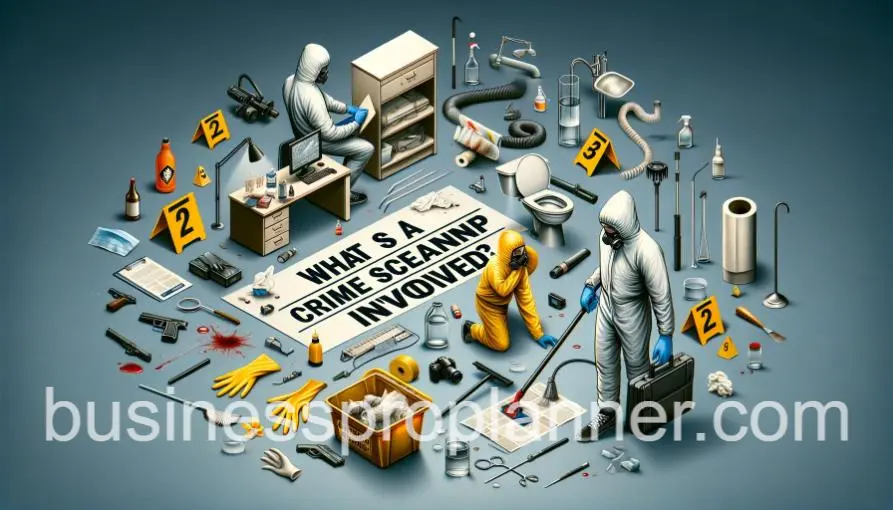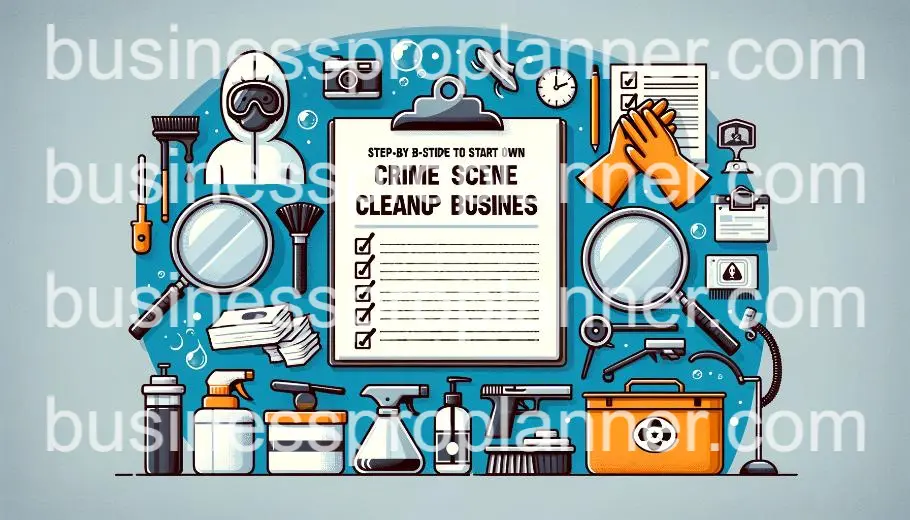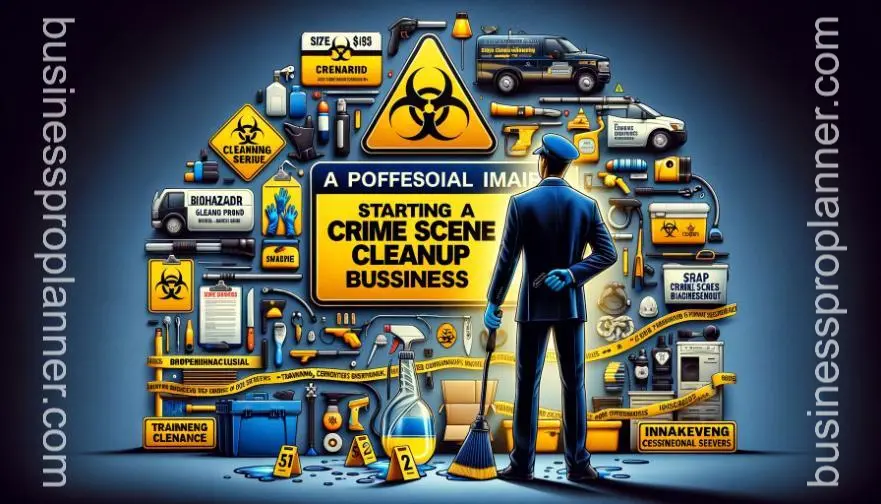The crime scene cleanup industry provides an essential service in contemporary society by professionally handling the biohazards, blood, and other potentially dangerous materials left behind at a crime or trauma scene. As violent crime rates continue to rise in many areas, the need to start reputable crime scene cleanup business continues to grow as well.
This creates a unique business opportunity for entrepreneurs interested in starting a crime scene cleanup company. This comprehensive guide will walk through all the key steps in launching your crime scene cleaning service to capitalize on this demand.
From understanding the cleanup process to obtaining proper training and certifications, securing licenses and insurance, buying equipment, and effectively marketing your business. We will cover everything you need to know to build a successful company in this industry.
What is a Crime Scene Cleanup Involved?
At its core, professional crime scene cleaning involves the safe handling and proper disposal of the hazardous materials left behind after a traumatic event like a homicide, suicide, or unattended death. Crime scene cleaners are responsible for restoring order to the area by methodically eliminating dangerous bodily fluids, blood, medical waste, and other potentially infectious pathogens.

Typical crime scene cleanup process includes an initial assessment of the scene, donning appropriate protective gear, meticulously cleaning and disinfecting impacted areas, safely removing and disposing of contaminated materials under regulations, and deodorizing the space. Crime scene cleaners require specialized training to work with biohazardous materials in a way that protects themselves and the public from further harm.
Pros and Cons to Start a Crime Scene Cleanup Business
Pros:
| Benefit | Details |
|---|---|
| Steady demand | Crime rates and unattended deaths ensure an ongoing need for these services in communities. |
| Specialized skills | You utilize niche training and biohazard expertise not common in the marketplace. |
| Varied jobs | Work involves homicide, suicide, hoarding, blood spills, and other scene types providing diversity. |
| Noble service | You help families and communities heal and restore order after traumatic events. |
| Lucrative business | Skilled services allow you to command premium pricing in this niche industry. |
| Mobile work | Traveling to scenes provides flexibility and convenient logistics. |
| Rapid growth | Specialized skills, recurring revenues, and strong margins enable business expansion. |
| Referral networks | Police, hospitals, and examiners provide direct sources of new crime scene jobs. |
Cons:
| Challenge | Details |
|---|---|
| Mental toll | Repeated exposure to traumatic scenes can be psychologically taxing. |
| Biohazards | Workers must take safety precautions when handling biological contaminants. |
| Overhead costs | Significant startup and equipment costs for training, supplies, insurance, etc. |
| Licensing hurdles | Extensive permitting and regulations to legally handle waste transport and disposal. |
| Irregular schedules | On-call jobs disrupt work-life balance and require 24/7 availability. |
| Customer reluctance | Some view crime scene cleaning as distasteful despite societal need. |
| Privacy concerns | Must handle discreet personal details encountered at sensitive crime scenes. |
| COVID risks | Added precautions needed to disinfect scenes contaminated by the virus. |
Step-by-Step Guide to Start Your Own Crime Scene Cleanup Business

Understand the Crime Scene Cleanup Process
Crime scene cleanup technicians encounter various types of traumatic scenes that require proper biohazard remediation. Homicides and suicides often leave behind blood spatter and bodily fluids. Unattended deaths may involve decaying matter. Large blood spills require absorbents and disinfectants to fully remove the biohazard. Understanding how to safely handle these infectious materials is critical.
The cleanup process starts by assessing potential health risks and contamination levels. Next, technicians don personal protective equipment to shield themselves. They prep the area by removing objects that cannot be disinfected. Cleaners use chemical agents, pressure washing, and scrubbing to fully decontaminate surfaces.
Absorbent powders help solidify liquid waste. All contaminated materials get bagged in red biohazard containers and hauled away for specialized disposal according to hazardous waste regulations. Aeration devices eliminate lingering odors. Finally, antimicrobial treatments inhibit bacterial growth. Proper protocols protect workers while thoroughly sanitizing the environment.
Crafting a Robust Business Plan
A well-developed business plan provides an essential roadmap for launching a profitable crime scene cleanup company. It should outline your unique value proposition and target customer base through market research of competitors and industry trends.
Select a memorable yet professional business name and registered brand identity. Detail the certification and professional associations that lend credibility. Provide an overview of your offered cleanup services for crime scenes, hoarding, biohazards, blood spills, tear gas residue, and other scenarios.
Outline your marketing plan for getting discovered by customers online and via partnerships with police, medical examiners, and trauma recovery networks. Highlight any advantages your business model provides through unique process innovations or rapid response capabilities.
Include financial projections of startup costs for training, equipment, insurance, licensing, and vehicles. Provide an ongoing operations budget accounting for projected revenue and salaries. This comprehensive plan becomes your roadmap for launching and growing a competitive crime scene cleaning business. It demonstrates expertise to attract investors if needed.
Obtain Required Training and Certifications
Start a professional crime scene cleanup business requires proper training and certification to perform this specialized work safely and effectively, including:
- Technicians must complete an OSHA course on Bloodborne Pathogens to protect themselves and their clients when handling biohazards.
- The 40-hour HAZWOPER certification teaches critical skills for hazardous materials and waste management.
- Hands-on training for crime and trauma scene processing teaches evidence identification, proper cleaning techniques, and safe material disposal methods.
- Programs available through the American Bio Recovery Association cover all aspects of biohazard remediation.
- Earning a Crime Scene Cleanup Technician certificate demonstrates comprehension of industry best practices.
- Many states mandate individual licensing for biohazard waste transportation and disposal.
Proper training lends credibility with customers, provides job site safety skills, and shows you operate at the highest professional standards. Continuing education enables crime scene cleanup crews to deliver effective, compliant services.
Obtain Required Training and Certifications
Operating a professional crime scene cleanup business requires proper training and certification to perform this specialized work safely and effectively, including:
- Technicians must complete an OSHA course on Bloodborne Pathogens to protect themselves and their clients when handling biohazards.
- The 40-hour HAZWOPER certification teaches critical skills for hazardous materials and waste management.
- Hands-on training for crime and trauma scene processing teaches evidence identification, proper cleaning techniques, and safe material disposal methods.
- Programs available through the American Bio Recovery Association cover all aspects of biohazard remediation.
- Earning a Crime Scene Cleanup Technician certificate demonstrates comprehension of industry best practices.
- Many states mandate individual licensing for biohazard waste transportation and disposal.
Proper training lends credibility with customers, provides job site safety skills, and shows you operate at the highest professional standards. Continuing education enables crime scene cleanup crews to deliver effective, compliant services.
Gain Necessary Licenses and Permits
Before providing cleanup services, businesses must acquire all required federal, state, and local licenses and permits, including:
- Business License: First, ensure you have a valid business license. It’s the legal foundation for your crime scene cleanup business.
- Biohazard Permits: Acquire industry-specific permits for handling and disposing of biohazard cleanup waste. This demonstrates your commitment to lawful and safe operations.
- Transport Permits: Secure permits for the transportation and storage of hazardous materials. This is crucial for managing medical waste and other hazardous substances.
- Regulatory Compliance: Meeting OSHA and EPA regulations is non-negotiable. It’s integral to running your crime scene cleanup services responsibly and ethically.
Purchase Equipment and Supplies
Well-equipped crime scene cleanup technicians arrive on-site with proper protective gear, tools, and vehicles:
- Personal protective equipment like OSHA-rated suits, gloves, goggles, and foot coverings maintain worker safety when handling biohazards.
- Powerful disinfectants registered by the EPA neutralize dangerous pathogens.
- Medical waste containers and red bags safely contain contaminated materials for transportation and disposal.
- Durable hand tools for scrubbing and waste removal equip the team.
Company transport vehicles must meet hazmat requirements for carrying contaminated cargo from scenes to waste management facilities. Proper gear enables crews to professionally and safely conduct scene remediation.
Find Your Niche and Set Competitive Rates
- Specialize in Specific Crime Scene Types: Focus on particular types of crime scenes, such as homicides, suicides, or trauma scenes, based on your training and certification. Specialization can set your crime scene cleanup business apart.
- Establish Key Relationships: Build connections with local police departments and medical examiners. These relationships are crucial for getting referrals and staying informed about potential jobs.
- Competitive Pricing Research: Analyze your competitors’ rates to understand the crime scene cleanup industry pricing standards. This research will help you set fair yet competitive rates.
- Customized Pricing Packages: Develop pricing strategies based on the type and size of the crime scene. Offering tailored packages can cater to diverse client needs and enhance your service business appeal.
Handle Legal and Business Formalities
- Business Structure Decision: Opt for an LLC or S-Corp structure for legal protection and tax benefits. This is a crucial step in formalizing your small business.
- Insurance Policies: Secure necessary insurance like workers’ compensation and general liability. Insurance is vital for safeguarding your business against potential liabilities.
- Legal Documentation: Draft clear contracts, waivers, and agreements. These documents are essential to define the scope of work and protect your crime scene cleanup services legally.
- Financial Systems Setup: Establish a robust system for accounting, payroll, and tax compliance. Keeping your finances in order is key to running a crime scene cleanup business successfully.
Market Your Crime Scene Cleanup Business
- Highlight Services on Your Website: Develop a user-friendly website showcasing your crime scene cleanup services. Include detailed information about your biohazard training and the types of scenes you handle, such as trauma scenes and biohazardous materials.
- Directory Listings: Get your crime scene cleanup business listed in local and professional directories. This enhances visibility and underscores your presence in the cleanup industry.
- Connect with Law Enforcement and Medical Examiners: Establishing relationships with police departments and medical examiners can provide a steady stream of referrals. They’re key partners in the crime scene cleaning process.
- Utilize Social Media Marketing: Actively promote your services on social media platforms. Share insights about crime scene cleanup and biohazard cleanup procedures to educate your audience.
- Local Advertising Campaigns: Invest in local advertising. It could be community newspapers or local online ads to reach potential clients within your community.
- Emphasize Compliance and Safety: Use your marketing materials to stress your compliance with OSHA regulations and your use of protective gear. It reassures clients of your professionalism and commitment to safety.
- Tailored Service Offerings: Promote the diverse range of services you offer, from handling medical waste to cleaning up after various types of crime scenes. This demonstrates your versatility in the field.
- Client Testimonials: Share reviews and testimonials from past clients. Positive feedback about your efficient cleanup and respectful service can significantly boost your business’s reputation.
By strategically marketing your crime scene cleanup business, focusing on your specialized training. Compliance with safety standards, and building strong community relationships. You will effectively reach your target audience and build a trustworthy brand.
Navigating the Challenges
Operating a crime scene cleanup company comes with unique emotional and mental health challenges for technicians and owners.
- Being repeatedly exposed to traumatic scenes involving violence, death, and serious injuries can take a psychological toll.
- Technicians should be provided resources like counseling to process the distressing sights and experiences that come with this vital work.
- Company owners also carry the responsibility of supporting technicians and making sure they don’t succumb to compassion fatigue.
- Creating an open and understanding work culture is important, where team members look out for each other during and after challenging jobs.
- Managers should watch for signs of withdrawal or trauma build-up and intervene appropriately.
Having robust support systems prepares cleanup crews to better cope with the emotionally taxing nature of cleaning biohazards, suicides, and other deeply disturbing scenes.
Running and Growing Your Business
- To build a thriving crime scene cleanup company, focus on delivering compassionate and high-quality services, hiring the right technicians, and providing ongoing training.
- Cleanups should be handled with discretion and sensitivity to assist grieving families.
- Technicians must receive clear protocols and expectations for professionalism.
- Expand into related fields like hoarding cleanup, tear gas residue removal, and meth lab decontamination using your proven expertise in trauma cleaning services.
- Pursue contracts with police departments, nursing homes, and hospitals by emphasizing your deep biohazard remediation experience.
- Implement efficient scheduling and dispatching systems to minimize delays.
- Market through search optimization, social media, and outreach to referral sources.
- Stay on top of regulations and insurance requirements as you scale up.
- Most importantly, maintain a strong support network and open culture as the business grows. Your technicians are exposed to traumatic situations daily and need resources to preserve their mental health.
By prioritizing compassionate service, ongoing training, and employee well-being, you can build a thriving and reputable crime scene cleanup company.

Conclusion
The crime scene cleanup industry harbors significant growth potential, offering new business owners a viable and profitable business opportunity. For those ready to launch their crime scene cleanup venture, the industry’s expansion signifies a promising career.
Specialized training, particularly in OSHA bloodborne pathogens, is essential. This ensures compliance with the Occupational Safety and Health Administration standards, an important requirement for any medical waste disposal company.
Running this business, whether as a traditional business or from home, involves unique challenges, but the demand to start crime scene cleanup business continues to rise. The cost to start can be offset by the long-term benefits of providing a vital service like trauma scene cleanup.
For aspiring business owners, success hinges on understanding the nature of the business and effectively promoting a crime scene cleanup service. Remember, a strong foundation in industry-specific knowledge and a commitment to quality service are your stepping stones in this competitive market.
